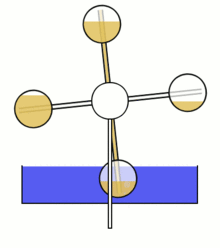Minto wheel
| Minto wheel | |
|---|---|
 Minto wheel rotating through heated water | |
| Classification | Heat engines |
| Application | Toy, Scientific demonstration |
| Fuel source | Heat transfer |
| Components | Bulbs, Tubes, Axle |
The Minto wheel is a heat engine developed by Wally Minto.
The engine consists of a set of sealed chambers arranged in a circle, with each chamber connected to the chamber opposite it. One chamber in each connected pair is filled with a liquid with a low boiling point (propane (TB = −42 °C) and R-12 (TB = −29.8 °C) are listed in the Mother Earth News articles). As the lower chamber in each pair is heated, the liquid begins to vaporize, forcing the remaining liquid to travel to the upper chamber. This fluid transfer causes a weight imbalance, which causes the wheel to rotate. Minto's pamphlet also suggests obtaining a pressure differential with a dissolved gas instead of a boiling gas. Soda water or propane dissolved in kerosene are suggested.
The Minto wheel operates on a small temperature gradient, and produces a large amount of torque, but at very low rotational speed. The speed of rotation is directly proportional to the surface area of the containers used, the volume, and the height of the wheel. The higher the ratio of surface area to volume, the greater the rate of revolution.
A working example of a wheel was first published in a series of articles in The Mother Earth News, Issues #38 March, #39 May and #40 July 1976.
Test units constructed by Mother Earth News (Issue 40, July 1976) and the MythBusters (Episode 24, December 5, 2004 – "Ming Dynasty Astronaut") did work to convert temperature difference into torque; however not as well as overenthusiastic boosters claimed.[citation needed]
See also
- Drinking bird
- Stirling engine
- Ocean Thermal Energy Conversion
External links
- Scans of the 1976 The Mother Earth News articles
- Wally Minto's original booklet
- Minto outline
- YouTube video of a model Minto wheel in operation
- YouTube video of a model Minto wheel in operation (shows smoother action from more chambers)
- 1881 patent for the device granted to the Iske brothers